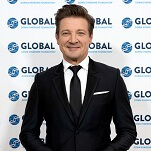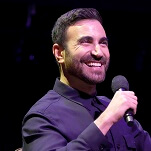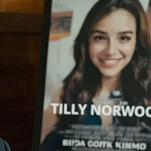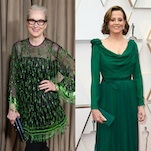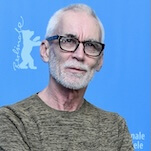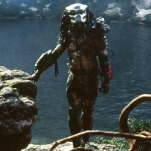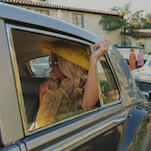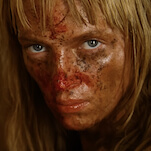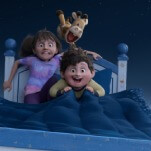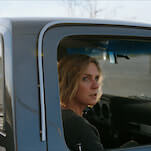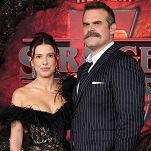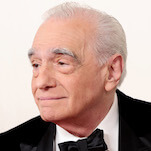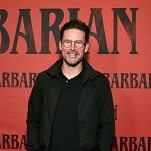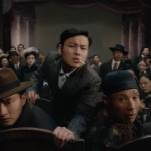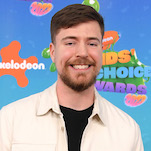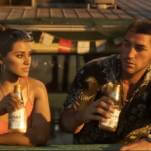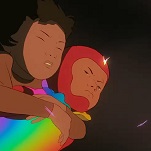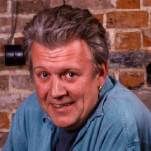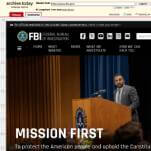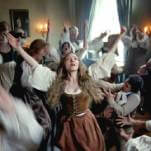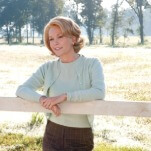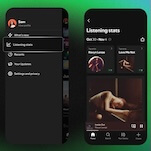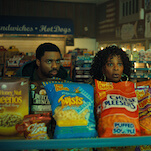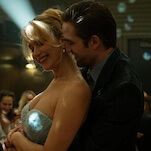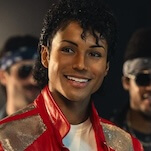It feels like you can’t get away from Rachael Ray, and that’s just the way she likes it. The Glens Falls, New York native says that she has five jobs in New York City alone, but it feels like she has even more. Her eponymous daytime talk show is going into its sixth year, and she has also fronts a magazine, Every Day With Rachel Ray, and extensive lines of cookware and gourmet foods. But it was her concept of making elaborate meals in a half hour that started her on the Food Network in 2001. Currently, she stars in three shows on the channel: her signature show, 30 Minute Meals, Week In A Day With Rachael Ray and the new, Rachael Vs. Guy Celebrity Cook-Off, which debuts January 1. In the new show, Ray and fellow ubiquitous Food Network star Guy Fieri coach teams of celebrities in an elimination cooking contest, with the winner getting $50,000 for his or her charity. Celebrities cooking on the show include Lou Diamond Phillips, Coolio, Summer Sanders, and Taylor Dane. As she was driving to her upstate New York cabin for the holidays, Ray talked with The A.V. Club about her busy schedule, why people don’t get star-struck over celebrity chefs, why she laughs off criticism from Anthony Bourdain and others, and how she finds new music to feature at her yearly South By Southwest picnic.
I mean, [it was a] hugely entertaining concept as far as I was concerned. But I wasn’t prepared for how intense it was. We went in there thinking we’d be there several hours a day, but we ended up there 12 and 14 hours a day. It was incredibly intense. It wasn’t over-produced: These people did all of their own work, there wasn’t a lot of behind-the-scenes culinary help for them. Everything about this was legit and intense, and these people, our celebs, they worked their guts out. Seriously. It was so hard to watch them and not be able to literally help them. All we could do was coach. We can’t physically touch the food or teach them a technique by allowing them to watch us perform it. They have to use their own skill set. We can only use our words, really, to help them. It’s frustrating. It’s really hard. It’s like watching a loved one play in traffic. I’ve said this a couple times, but it’s true. And they’re playing in traffic with sharp knives, and flames, and hot pots and pans, you know, and cars whizzing at them.
RR: Some of them I think are harder than the stuff you see on Top Chef. You know, cooking for 150 people in 100-degree heat on a pier is pretty tough. Cooking street food for people literally on a streetcar, not being able to prepare it in a main kitchen… you know, a lot of people that have food trucks and carts, they also have access to a huge production kitchen, and then they just reheat and assemble on the trucks themselves. I mean, they have challenges where they have to prepare everything literally in the street. They have other challenges where they’re cooking in front of the judges of Chopped, and the judges see everything. There’s nowhere to hide; they’re right there in front of them the whole time. It’s very, very intense. Considering these people, none of them have background in a professional kitchen, it was really surprising how tough they hung in there. And the quality of food, I also thought was really surprising. Excellent food.
AVC: Did they fashion themselves as hobbyist cooks when they came in?
RR: Some of them. Some of them just love food, but they are not familiar with the kitchen at all, but they wanted to have a personal challenge, and food is something they’re interested in becoming better at. And then some of them are really good home cooks, but that doesn’t necessarily help you when you’re cooking for a very high number of people, or cooking for a world-class chef. Regardless of how good their cooking skill level was when they came into it, I think all of them felt very off-balance every week in one way or another.
AVC: Who surprised you?
RR: Everybody surprised me! I was shocked at the skill level. Taylor Dayne said she’s dated a ton of chefs in her life, but she stinks in the kitchen. Then she comes up with, just in the first episode, one of the tastiest gazpachos I’ve ever had. It’s 100 degrees outside… how’s she going to get the gazpacho to be icy cold? Every time she blends up one for one of the customers at this street fair, she throws in a couple of ice cubes. She’s brilliant. It gives you these little tiny flecks of ice running through it, it keeps it super cold… really, really smart, smart, smart. She’s somebody who thinks she’s a lousy cook. Lou Diamond Phillips, if he owned his own restaurant tomorrow, I would go there and lay down my money. Coolio, I was shocked! He has like a whole web following and his food was insane! Insane. Insane. I’ve known Cheech [Marin] for many years, and he has a garden, and fig trees on his property. So I knew he was going to be good, but I had no idea how elegant some of his dishes would be. Summer Sanders, she’s been on my talk show before, so I knew she’d be okay. But I was amazed at like how really good they all are. And the guts they had! I mean, no guts, no glory. These people were like animals. Animals. And none of it was faked out for them. Not a thing.
AVC: Do you think these people are a product of watching shows like yours, and Guy’s, and Top Chef?
RR: Yeah! I think that celebrities are just people, like everybody else, and they’ve got the foodie bug in them too. I was with Rosie O’Donnell a few weeks ago and I was telling her about this, and we were just chit-chatting. She was like, “Oh my God, I want to be on that SO BAD! Can I be on it next time?” I’m like, “Yeah, yeah, sure!” Same thing with the daytime show. I’ve been telling a few people about it because we did a sister competition on the daytime show every Friday for three weeks during the Guy vs. Rachael thing. Guy and I host a Guy Vs. Rachael with viewers, and it’s mothers and daughters vs. fathers and sons. The kids win scholarships, and the parent wins a new kitchen. Just chatting with the celebs that were on in the other [daytime] episodes, because we shoot three episodes a day, everybody we told about it’s like, “Oh my God, can I do it next time? Can I be a part of it?”
Donnie Wahlberg, he so sincerely wanted me to show him how to make a meal, like the whole meal, from start to finish because he’s always wanted to have that. Because one of his brothers is a chef, and he’s always wanted to be able to go into a kitchen and feel “Okay, I at least know how to make one meal. This is like my thing.” Other people like Kate Hudson come on and they’re amazing cooks and they want to show you one of their dishes. You know, Avril Lavigne came on, for Christ’s sake, last week and she said she used to tape herself in the kitchen when she was 12 and imagined she had her own cooking show. She’s always wanted her own cooking show.
So a lot of the people that come on the show ask to be in the kitchen. Jason Segel wanted to help me make It’s Not Easy Being Green Bean Casserole when we did his Muppet show. And he’s like, “Oh my god, I’m going to go home and make green bean casserole!” I mean, people get excited about food. It brings people together, and I think it brings out the best in them. The celebrities that do the best in this show are the ones that make it really, really personal, and they can tell a great personal story with their food and put a lot of their personality into their food.
AVC: How have you seen the Food Network evolve in the decade you’ve been with them?
RR: Brooke Johnson [president of Food Network] and I, we’re great friends. And I think that she has really brought a fabulous direction to Food Network and to Cooking Channel. You know, Food Network 10 years ago was largely weekend, and early evening, and daytime. Now look at it. It’s almost the complete opposite. It’s fine during daytime, but all of the big shows for people are now… it’s like a real prime-time destination.
AVC: It’s like two different networks: You’ve got cooking shows during the day and competition shows at night.
RR: Yeah. But what a great way to evolve, you know?
AVC: How do you think that evolution has made things more relatable to viewers, and has it contributed to the explosion of foodies in our culture?
RR: When I started on Food Network, Emeril was the man—and in my opinion, remains the man—but you know, today there’s so much more. Just more, period. There’s two channels now. You have the Cooking Channel and the Food Network. Plus, you’ve got Bravo with Top Chef and all that. So there’s just more. There’s literally something out there for everybody now. I think there’s every sort of skill level available for people out there when it comes to the programming as well. I don’t know if I was any part of that or not, but I do think that because Food Network, 10, 12 years ago or whatever, said it was okay to not only have chefs on there, but to have people that are good cooks, kind of opened up the ballgame a lot.
The fact that they hired me knowing that I’m not a chef, and let me cook in plain clothes, and serve my food, and have things look less than perfect, of course I was happy about that. It made me employed. But I think that for the home viewer, it broadened an audience for them by a lot. That sort of programming where you can be less than perfect and it’s okay, especially when it comes to something as visceral as food, it’s supposed to be about coming together and about sharing, and these big, big themes, I think that really opened up the floodgates for a lot of people. Not having it always be about the best of the best, or the most precious, or the only particular way to do something, but just having it be about food, period, as a celebration. For me, everything I do, whether it’s a talk show, or a magazine, or a cookbook, or this game show we’ve got, the main theme, the main message for me has to be, “Everyone’s included in this.” You can be young or old, rich or poor, male or female, and you can feel a part of this, you can feel like you can do this, or participate. Or that you’re part of this conversation, or that you have the skill set to achieve this yourself. It has to feel like something that anybody could aspire to do. I think that’s what I liked about this celebrity show. It’s really charming watching these people humble themselves and work their guts out like that, and bust a sweat, and put love into their food. And then be judged for it! It’s tough! But it’s exciting.
AVC: Chefs have become bigger celebrities than 10 years ago. How do you think this “Everybody can do it” philosophy has made guys like Eric Ripert and Mario Batali into bigger stars than they were in the ’90s and early 2000s?
RR: You know what weird? Hugh Jackman was on the [daytime] show to talk about coffee, and he also talked about the movies and told great jokes. But everybody in the audience almost fell over when they saw it was Hugh Jackman. They were screaming, ga-ga-ing, and just losing it. When he left, everybody was like breathing heavy, and flushed in the face, and “Oh my God,” hands trembling if he went over and shook their hand. Whereas Mario comes on or Guy comes on, any of those celeb chefs, Emeril, and everybody says, “Hey!” You know, shouts at them as if they’re their next-door neighbors, or their cousins, or their buddies. They don’t feel weird coming up and hugging it out or anything. If you’re known as a cook, that’s what you are in people’s minds.
There’s still an accessibility there, in my opinion. People still feel like you’re one of them, you’re one of the gang. You’re on their side because you’re in the kitchen with them. So yeah, there’s a lot more celeb chefs, but I still think that celeb chefs are still thought of as cousins, or trusted next-door neighbors, or maybe a teacher you really loved in high school or something. People aren’t as weird, they’re not as star-struck. Same thing with Guy walking down the street. People just give him a shout-out. They won’t run over trembling. They’ll come over and pound it out, or pat him in the back or something, you know?
AVC: There are people out there like Anthony Bourdain who do criticize that kind of “everyday cook” philosophy that’s on the food networks. But when I talked to Bourdain he said he can’t make fun of you anymore because you sent him a gift basket.
RR: Nah, he’s funny. I didn’t mind a bit either way. He’s also said a few nice things over the years. But you know what? Not everybody is supposed to like everybody on the playground. You gotta be thick-skinned about that. I love Tony Bourdain. I love his books, I love him, I love his attitude. I think he’s fantastic. Whether or not he likes what I’m doing that week in my life, or the food that I’m making at that moment, that’s Tony’s choice. It shouldn’t affect my decision about whether or not I like his work. Otherwise I think I’m being immature and mixing up the two. But regardless, that’s not my job and it’s not who I work for. I work for the people who do want that type of programming or do want to cook my type of food.
And quite frankly, I think a lot of my food would surprise Tony Bourdain and stand up to anything he can cook in a kitchen. I like my food. I make no apologies for it. I think I do cook a hell of meal on many, many levels. Am I technically as savvy as Tony Bourdain or Mario Batali? Absolutely not. But can I make an excellent meal? Hundred percent. And I’m proud of that. But I think that people over the years have wasted so much time asking me about Martha [Stewart] or Tony and all this. I’m like, it’s never, ever, ever, ever, ever entered my mind for five seconds if somebody else wasn’t putting it there.
I mean, those aren’t the people you work for. I am a waitress at heart. I work for the people that I’m there to serve. I want to bring them what they want. You know? They’re the boss. When they’re done with me, they’ll ask for their check, and that’s when I’ll have more time off. Know what I mean? But until then, I try and listen to their feedback, I try to talk to people at book-signings, at the grocery store, I read the mail we get, and take a look at what’s going on on our own website, and the feedback we get at our show. Those are the things that dictate what I’m going to write next week, or decisions that I’ll make the week after, as to what projects I’ll be involved in next. They’re my boss. And I think that anyone who spends their life trying to make other people happy or impress their peers rather than their customers are going to have a very short-lived career.
AVC: Where do you think your perspective came from, where these things roll off your back?
RR: That’s the way I was raised. You have to take work seriously, and you take your family seriously, you take any animals you care for seriously. You do not take other people throwing sticks and stones seriously. Everybody has a right to their opinion, and quite frankly, there probably isn’t too much Tony has said about me over the years that wasn’t true… if you were Tony. Who cares? I just don’t have time. I have too much legitimate work to do, and that’s just simply not the way I was raised. I have no example of that in my life. My mother managed people for 45 years. She never took things personally. When you’re a businessperson, you don’t. When you’re a hard worker, you don’t. You take your job seriously. You don’t take backstabbing, or name-calling, or any of that. You follow the example of the people that are around you when you’re raised. My mother just would never participate in any of that.
AVC: You mentioned taking care of animals. Is that one of your biggest causes?
RR: Yeah, animal rescue. And my children’s organization Yum-o is financed from a division of… every manufacturing line I have has a set amount of product within it that does the same thing so that there’s a constant revenue stream. Any product that has the Yum-o burst on it, 100 percent of my proceeds go back to that charity so that we have a constant stream of revenue without having to have charity balls, and giveaways, and auctions and stuff. With that money, we have a scholarship program, we have Healthy, Hunger-Free Kids Act program where we do lobbying and projects with schools all over the country, getting healthier food into our schools and lowering the obesity rates. So that’s equally important to me because I don’t have children of my own. That’s my way of sort of paying it forward and making sure I’m putting some kids through college and I’m helping improve the health of other kids and lowering the obesity rates. All of those things, that’s the payoff for me. From being on TV and having a lot of fun, and getting paid nicely to do things that I would do on a day off, that balances it out for me. It helps me give back to the things I care about: kids and animals.
AVC: How do you think you would have been able to do this if you were still doing cooking classes in upstate New York instead of being on TV?
RR: Well, even before Food Network, I was talking to the local government and the local officials in Schenectady, and my mom and I were going to teach classes to low-income moms to teach them how to stretch a dollar better, and to teenage moms, and latchkey kids. We were trying to get a space that they would allow us to do that in. Then everything happened with the Food Network and I ended up moving back to New York City. But I mean, everybody can give to their community. If you care about animals, you can volunteer at a shelter. You can foster a dog. You can go down to the local school if you want to help the childhood obesity rates or hungry kids. Offer to build a garden at your local school. Stop at the food bank and offer to teach a healthy cooking class, if you’re a great home cook, for low-income families. Stock shelves. Drop off a can of food. I mean, you don’t have to be on television or have some big pot of cash at the end of a special rainbow to do things. Everybody goes out there in the world and everyone is capable of giving service to others in some small way, whether it’s money or time. I think this is a time of year everyone has to be mindful of their service to others.
AVC: Your South By Southwest parties are always interesting to read about—
RR: I love South By Southwest! It is my second Christmas.
AVC: Your husband is in a band, but how long have you been a music fan?
RR: Forever! All of my life. My dad had a fantastic record collection: opera, and some of the jazz greats from back in the day. So through my dad, I developed a love for opera and jazz. In high school, it was a real small high school. You know, a party for us was listening to Led Zeppelin in the woods with a bonfire. There was little else to do but play records. My sister and I belonged to the Columbia Record Club. I’ve always had a really eclectic and very broad sense and taste for music. My husband, he has a band, but he also loves going out and listening to new bands. So it’s something we’ve done together for the 12 years we’ve been together. It’s just an enormous amount of fun to me to be able to bring in a group of musicians that I love, people that people have never heard of, to people that are legends, and have all those people and great food come together. I’d love to see feedback grow so that we can do it more than once a year, maybe do it in other cities. I really love throwing a party with good food, great music, an eclectic lineup, and thanks to our sponsors, we’ve even had drinks every year. I mean, can you get better than that? A cocktail and food and music? [Laughs.]
AVC: What’s your favorite recent memory from one of those parties?
RR: You know, everybody that plays is just so different that it’s really hard to… it’s too hard. Because I mean, I love G-Love, and if G-Love’s just with his guitar and he makes up a song with my name in it at the little house that we have for singers and songwriters, that’s a moment. On the other hand, if you have like, Fitz And The Tantrums and everybody gets down in the mud and does the turtle, that’s another moment. And that’s what I love about having really eclectic lineups. And you know, seeing the New York Dolls a couple years back, huge. Huge! Like one of my favorite bands of all time, you know? That’s what l love. I guess the overall thing that I love best about South By Southwest is that we can provide that experience that’s literally for everybody. There’s something musically for everyone, there’s a nibbly bit for everyone, and I just love that. It’s not just rock ’n’ roll, or just pop, or just rap, or just country or Tex-Mex. We have something for everyone.
AVC: How do you find new music these days?
RR: If it’s new people, friends of mine, like John’s bandmates that are really good musicians, they’ll put together these blind mix-tapes. Or you’ll hear them on satellite radio a lot. I jot down bands off satellite all the time. But I like to get the blind gifts from all of our friends that work in the music industry of people that are up-and-coming and haven’t quite hit yet. I just write down, “I like No. 4, 11, 12…” if they’re going to South By, invite them. Then other times it’s just bands like Edward Sharpe, we invited him for this year because he played with us a few years ago and after that, he became huge. So we love to ask people to come back too, if they’ve had a good experience with us.
